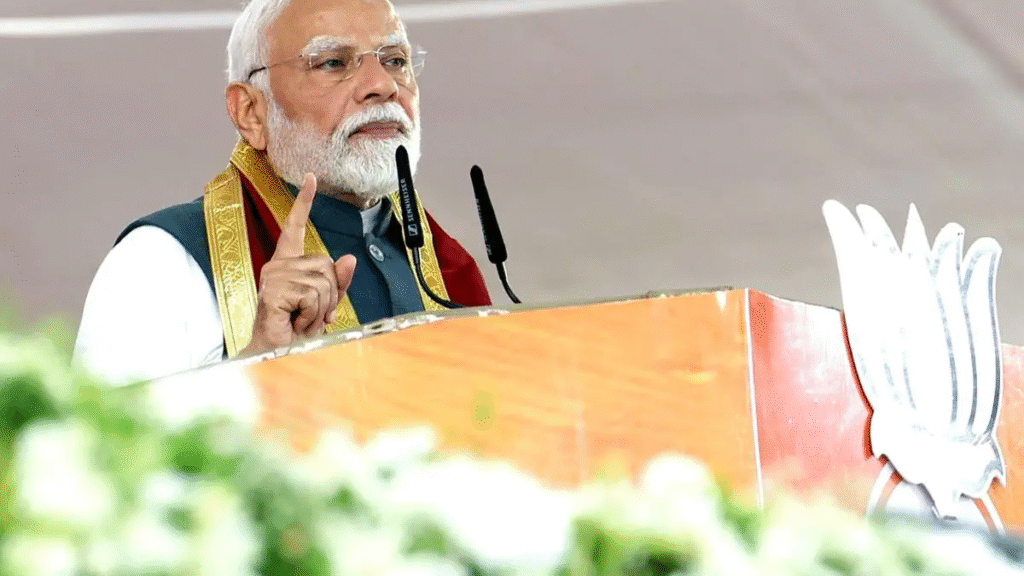Modi Declares Operation Sindoor Ongoing
On May 29, 2025, Indian Prime Minister Narendra Modi announced that Operation Sindoor, a military offensive against Pakistan-based terror groups, is not over.

Speaking in Bengal, he emphasized India’s resolve to combat terrorism. Modi warned that Pakistan would face a heavy price for sponsoring terror attacks.
Background of Operation Sindoor
Operation Sindoor began on May 7, 2025, in response to the April 22 Pahalgam terror attack in Kashmir, which killed 26 civilians, mostly tourists.
India accuses Pakistan of backing the attack, claimed by The Resistance Front (TRF). The operation targeted nine terror camps in Pakistan and Pakistan-occupied Kashmir (PoK), destroying infrastructure linked to groups like Jaish-e-Mohammed and Lashkar-e-Taiba. Modi referenced past strikes, including the 2016 Uri surgical strikes and 2019 Balakot air strikes, as part of India’s firm anti-terror stance.
When and Where Modi Spoke
Modi made these remarks on May 29, 2025, during a public rally in Bengal, India. He spoke from what he called the “sacred land of Sindoor Khela,” a cultural reference to Bengal’s vermilion festival.
Earlier, on May 26, he addressed a rally in Bhuj, Gujarat, and on May 22 in Bikaner, Rajasthan, reinforcing India’s zero-tolerance policy on terrorism. His speeches consistently highlighted Operation Sindoor’s success and ongoing nature.
India’s Plan Moving Forward
India’s strategy is to maintain pressure on Pakistan to dismantle its terror infrastructure. Modi stated that India will not distinguish between Pakistan’s military and non-state actors, treating them as one. The government has suspended the Indus Waters Treaty, a critical water-sharing agreement, to economically strain Pakistan.
India is also pursuing global outreach, sending all-party delegations to expose Pakistan’s role in terrorism. Modi vowed to target terror hideouts across the border if provoked, signaling readiness for further strikes.
Pakistan’s Response
Pakistan denies involvement in the Pahalgam attack and rejects Modi’s claims as “provocative.” On May 14, Pakistan’s foreign ministry condemned Modi’s rhetoric, reaffirming commitment to a ceasefire agreed on May 10. Pakistani Prime Minister Shehbaz Sharif praised their military’s actions as a “golden chapter” and visited Pasrur Cantonment, hit during Operation Sindoor, to boost morale.
Pakistan expelled an Indian diplomat in retaliation for India’s expulsion of a Pakistani staffer. Analysts say Pakistan’s military is leveraging the conflict to bolster its domestic image.
Border Situation
A fragile ceasefire holds after four days of intense cross-border clashes from May 7-10, 2025, which killed over 70 people. Both nations agreed to reduce troop presence along the border, with talks ongoing.
However, tensions persist. On May 23, Indian border forces killed a Pakistani man crossing the Gujarat frontier, labeling him an intruder. Pakistan is investigating the incident, questioning the man’s identity. Schools in Punjab’s border districts reopened, but Jammu and Kashmir’s chief minister plans more bunkers for safety.
Modi’s statements reflect a hardened Indian stance, driven by domestic nationalist sentiment and a history of cross-border tensions. Operation Sindoor’s precision strikes showcase India’s growing military and technological capabilities, but the ceasefire’s fragility raises concerns about escalation.
Pakistan’s defensive posture and diplomatic counter-moves suggest a desire to avoid full-scale conflict while maintaining internal support. The border remains volatile, with both sides on high alert despite de-escalation efforts. International actors, including the U.S., encourage dialogue, but India’s suspension of the Indus Waters Treaty and focus on global outreach signal a long-term strategy to isolatePakistan diplomatically and economically.


 India Set to Face Pakistan in WCL Semifinal
India Set to Face Pakistan in WCL Semifinal  Pakistan Joins WHO to Provide Free Cancer Medicine to Children
Pakistan Joins WHO to Provide Free Cancer Medicine to Children  Trump’s $21M USAID Claim for India Elections Never Existed
Trump’s $21M USAID Claim for India Elections Never Existed  Did India Strike Pakistan’s Nuclear Hub Kirana Hills?
Did India Strike Pakistan’s Nuclear Hub Kirana Hills?  What’s Happening in Iran: India Urges Citizens to Exit
What’s Happening in Iran: India Urges Citizens to Exit  Why Did Bangladesh Choose Mangoes for PM Modi?
Why Did Bangladesh Choose Mangoes for PM Modi?